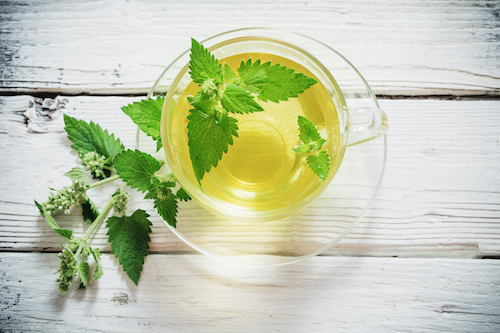
Since we are focusing on mental health and well-being this month, I thought it would be a good time to introduce lemon balm (Melissa officinalis), the lemon scented herb known to take stress and anxiety away. Research shows that it also helps with cognitive performance, mood and sleep. Its use as an anxiolytic, mild sedative, and memory booster has deep roots dating back from the middle ages.
Anxiety is commonly associated with menopause and interestingly there is a chicken and egg situation happening there: your sex hormones can affect your brain, but your brain can also affect your sex hormones. The decrease in sex hormones, particularly estrogen and progesterone, during peri-menopause and menopause, can lead to psychological symptoms, including mood swings, memory loss and anxiety. On the other hand, chronic stress and anxiety can have a detrimental effect on your sex hormones, by increasing the level of cortisol which is a known “stealer” of sex hormones. Cortisol shares the same chemical precursor as estrogen and progesterone, called pregnenolone, and during periods of stress pregnenolone is stolen form the sex hormone pathway to produce cortisol instead.
Either way, looking after your brain health and managing stress and anxiety is key.
Less anxiety and better sleep
Several clinical studies have shown the positive effects of lemon balm extract on patients suffering from anxiety. In one study, lemon balm extract was administered to individuals with mild-to-moderate anxiety for 15 days. This resulted in full remission of anxiety in 70% of the patients, and lemon balm also demonstrated benefits for sleep, with 85% of the patients experiencing a significant improvement in insomnia. Another study looked at the effect of administering lemon balm for 7 days to patients who had undergone heart bypass surgery. The results from this study showed a 49% reduction in levels of anxiety and a 54% improvement in sleep quality, in those patients.
How does it work?
It is proposed that lemon balm may work by increasing gamma-aminobutyric (GABA) levels in the brain. GABA is a mood regulator which works by stopping neurons from becoming overexcited, and low levels of GABA can lead to restlessness and anxiety. Lemon balm significantly reduces excitatory transmission in the brain by inhibiting an enzyme called GABA-T that breaks down GABA, thus increasing the amount of GABA available in the brain. The major compound in lemon balm responsible for this activity is rosmarinic acid, although it is known to work synergistically with other compounds.
How can I take it?
Lemon balm can be taken as a tea (6 – 12g of the dry herb daily). However, if you are experiencing high levels of anxiety it is recommended to take a therapeutic dosage in the form of tincture (liquid extract) or capsules containing 500 mg dry extract daily.
Lemon balm is generally safe and well tolerated with no contraindications, yet as with any herbal medicine treatment, it is always best to consult a qualified herbalist to assess your individual needs.
Lemon balm is a potent anxiolytic and calming agent with solid traditional and scientific evidence backing it up, so why not giving it a try? Surely, we could all do with a little more calm in our lives.
References
Cases, J., Ibarra, A., Feuillère, N., Roller, M. & Sukkar, S. G. Pilot trial of Melissa officinalis L. leaf extract in the treatment of volunteers suffering from mild-to-moderate anxiety disorders and sleep disturbances. Med. J. Nutrition Metab. (2011). doi:10.1007/s12349-010-0045-4
Soltanpour, A., Alijaniha, F., Naseri, M., Kazemnejad, A. & Heidari, M. R. Effects of Melissa officinalis on anxiety and sleep quality in patients undergoing coronary artery bypass surgery: A double-blind randomized placebo controlled trial. Eur. J. Integr. Med. (2019). doi:10.1016/j.eujim.2019.01.010
Haybar, H. et al. The effects of Melissa officinalis supplementation on depression, anxiety, stress, and sleep disorder in patients with chronic stable angina. Clin. Nutr. ESPEN (2018). doi:10.1016/j.clnesp.2018.04.015
Sarris, J., McIntyre, E. & Camfield, D. A. Plant-based medicines for anxiety disorders, part 2: A review of clinical studies with supporting preclinical evidence. CNS Drugs (2013). doi:10.1007/s40263-013-0059-9
Shakeri, A., Sahebkar, A. & Javadi, B. Melissa officinalis L. – A review of its traditional uses, phytochemistry and pharmacology. Journal of Ethnopharmacology (2016). doi:10.1016/j.jep.2016.05.010



